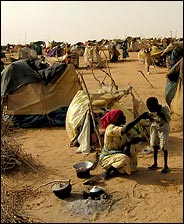UN moves Darfur refugees away from Chad border after militia raids
By JONATHAN FOWLER, Assocaited Press Writer
GENEVA, Oct 05, 2004 (AP) — The United Nations refugee agency said Monday it was moving people who fled Sudan’s conflict-ravaged Darfur region away from a volatile border area of Chad because of raids by Arab militias.

Three thousand people are expected to be trucked from Adre to a camp at Farchana, some 70 kilometers (43.5 miles) deeper into Chad. The camp already houses some 14,000 refugees from Darfur.
Sudan’s Arab-dominated government is accused of mobilizing an Arab militia known as the Janjaweed for attacks on Darfur’s non-Arab villagers in retaliation for uprisings launched by two non-Arab Darfur rebel movements in 2003. Arab herdsmen have long competed for resources with Darfur’s non-Arab population.
The conflict has displaced 1.4 million villagers from their homes and killed at least 50,000. On Monday, U.S. aid officials said the death toll could reach 300,000.
The United Nations and aid groups have called it the world’s worst humanitarian crisis. Most blame Sudanese authorities for at least stoking the conflict, but the government denies it is involved.
On Monday, U.N. Secretary-General Kofi Annan reported no progress by the Sudanese government to end the crisis, citing continuing clashes, attacks against civilians, escalating banditry and tribal conflict.
The U.N. Security Council is investigating allegations by the United States and others that the government and the Janjaweed are guilty of genocide. Sudan also faces the threat of U.N. sanctions.
More than 200,000 refugees from Darfur have crossed to neighboring Chad, where tension has risen because resources to care for the refugees are scarce.
Most of those near Adre had previously wanted to stay along the border, where they had Chadian relatives as well as enough land to graze their animals, Pagonis told reporters.
“But a short rainy season resulting in a poor harvest, the decimation of livestock from disease and attacks by Janjaweed militia led many refugees to request they be transferred to the camps,” she said.
“In recent days, refugees have reported that the Janjaweed have continued to cross into Chadian territory, essentially to steal cattle,” she added.
In addition to the refugees leaving the border with UNHCR help, a further 7,000 people have headed deeper into Chad by themselves, Pagonis said. Most have cited lack of resources in the border zone, she said.
